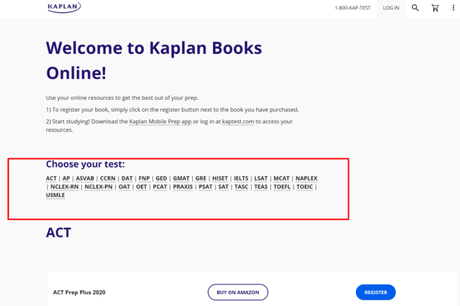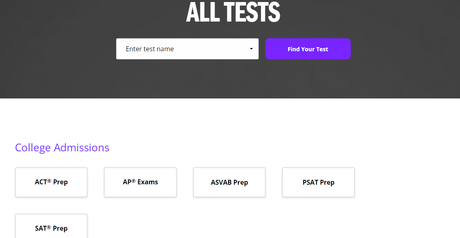In many ways, Kaplan and Princeton are the same when it comes to getting ready for the GRE.
They both use tried-and-true ways to prepare students, like live classes, pre-recorded video lessons, practice work, and analytics about how well the students are doing.
So, what do you do when the two courses you’re thinking about are as similar as Kaplan vs Princeton Review?
In this detailed guide that compares the two courses, we help you figure out what’s best for you.
Kaplan vs The Princeton Review 2022
Princeton Review GRE
Pros & Cons The Princeton
Pros
- Module-based curriculum for the GRE
- You will be captivated by these video lessons
- Practice tests that mimic the real GRE interface and difficulty
- Coursework includes top-notch prep books
- Built a connection with excellent live instructors
Cons
- The digital platform and interface of Kaplan are superior
- Kaplan’s live classes have fewer students than Princeton’s
Princeton Review Course Options & Pricing

Princeton Review prep packages differ by content level, whereas Kaplan course options vary by format. As part of Princeton’s preparation program, three options are available:
- Self-Paced
- GRE 10 Points+
- Fundamentals
- GRE 162+
The Self-Paced course is the least expensive option from Princeton Review. For about $500, you can learn online whenever you want. There are no live classes, and there are fewer questions to practice on.
The next level up is the GRE 10 Points+ course, which, as its name suggests, promises to improve your score by at least 10 points.
This is also a self-study package that you can use whenever you want, but it has more information than the basic Self-Paced course. The price is $900.
The Fundamentals course is Princeton’s most popular GRE course, and it gives students live instruction for about 24 hours.
This course is most like Kaplan’s Live Online class, and it costs about $1,200, which is a little more than that.
The GRE 162+ is something that Kaplan doesn’t have, but Princeton does. This type of course is designed for students who want to get into the best graduate schools and need top scores.
It focuses mostly on the math part of the GRE because that’s what most students find hardest, but it also goes into detail about the verbal part.
This course option has about 500 more practice problems and 45 more live class hours than the Fundamentals course.
It costs around $2,400, and students who want to get a score in the top 5–10% should think about it very seriously.
As of the date of publication, the course options and prices are correct.
Princeton Review Lessons & Coursework

The lessons from Princeton Review are a lot like those from Kaplan. Both have high-quality video lessons that teach in the same way.
Instructors at Kaplan, for instance, work out practice questions and write notes using luminous ink markers.
On a plate of invisible glass between the student viewers and the teacher, Princeton instructors use a dry erase marker to write notes and work out practice questions.
Both speeches are very good, and they sound a lot alike.
But what sets Princeton Review apart is that their course structure within modules is better.
Princeton uses a format that keeps coming back: Essentials > Lessons > Drills. They start each module with one or two short video lessons that explain the main ideas of the topic. This helps students understand the subject well.
The lessons continue with video lessons, practice problems, and a summary of the lesson at the end.
The module ends with a set of adaptive drills that really drive home the ideas that were just taught. When you look at the lesson plan and assignments as a whole, they are very good.
Even though the quality of the lessons and the topics they cover are almost the same at both companies, the Princeton course structure feels more complete than Kaplan’s, and our team loved it.
It flows well and is very easy to understand.
As we’ll see below, Princeton review has a little more than 3,500 practice problems, which is fewer than Kaplan.
Even though there is a difference in the number of practice questions, the Princeton Review problems are good.
These problems were clearly made by experts, and they are very similar to real GRE questions. Our team thinks they are more like real problems than Kaplan’s.
Also, 3,500 questions may be enough practice for many students to reach their goals.
Princeton Review Wins On Practice Tests
The number of practice questions might go to Kaplan, but the number of practice tests goes to Princeton Review.
Princeton has 8 full-length practice tests, but Kaplan only has 7. I know that some of you are thinking, “Oh, come on, just one more!”
But the truth is that when you only have 10 practice tests, each one is important.
If this were LSAT prep, and each company offered more than 80 practice tests, I’d be a lot less worried.
But because there are so few practice tests, these small things can make a difference, especially for students who learn best by doing.
So, if you are a student who wants to take as many tests as possible, you should think about Princeton.
When it comes to the quality of their practice tests, it’s hard to tell the difference between Princeton Review vs Kaplan.
They both use high-end digital platforms and adaptive technology that are like the real GRE to take their tests. On this point, we couldn’t really pick a winner.
Live Classes
If you want live classes, either to give your studies more depth and structure or because you can’t get yourself to study on your own, Princeton Review’s live classes are a little better than Kaplan’s.
Overall, the number of class hours is pretty close between the two (24 for Princeton Review and 21 for Kaplan), so it comes down to how well the classes are taught. For us, Princeton is the winner.
The lesson plans at Princeton just seemed to be better organized, and we got along better with the teachers.
Overall, we didn’t see a big difference between the two platform, but Princeton Review has a slight edge in this case.
Kaplan GRE Prep

Pros & Cons Kaplan
Pros
- Video lessons with visuals that boost retention that are fantastic, engaging, and fun
- A greater amount of online instruction and practice work (so much content)
- The small group live classes they offered were very engaging and effective
- Study on your own
- Online classes are available live
Cons
- For what you get, Kaplan is a little pricey
- Our preference is Princeton’s structure, even though its online content is of good quality
Kaplan Course Options & Pricing
Students can choose from three different course formats offered by Kaplan:
- Self-Paced
- Live Online
- In Person
As you might expect, the price of each prep package goes up with the amount of interaction and teaching that comes with it. So, the most affordable option is the Self-Paced course, which usually costs around $450.
The Live Online Course has scheduled live classes, where you and your teacher and other students meet regularly in a virtual classroom to learn. About $1,000 is needed for this course.
Lastly, Kaplan’s in-person course costs around $1,200, which is a little more than the Live Online course because it gives you more personal attention and instruction.
The prices for these courses are mostly the same as those at Princeton Review, but there are some differences, as shown above.
As of the date of publication, the course options and prices are correct.
The Kaplan Lessons & Study Material

Because Kaplan’s video lessons and coursework are top notch, we included them on our top GRE prep course list.
An instructor from Kaplan teaches some of the lessons in a traditional classroom setting as part of the 40+ hours of online lessons.
But instead of writing on an old whiteboard with their back to the class, the teacher writes on a digital whiteboard that follows along with the lesson and rolls through text, notes, and graphics in real time.
Also, the Kaplan instructor will sometimes take a marker and write notes on the screen in a way that stands out. They do practice problems right in front of you and explain concepts as they go.
The quality of the production is clear, and the use of different types of media to teach is a very effective way to learn.
After every video lesson, there is a short quiz to help you remember what you just learned. If you don’t answer a question, you’ll be told to go back and read how to do it.
We thought Kaplan’s explanations of the problems were helpful, though they might not have been as good as Princeton’s in general.
Even though they are shorter and more concise than most Princeton Review explanations, they give you all the information you need to understand why the right answer was right and why the wrong answers were wrong.
And Kaplan’s explanations of problems have to be short because each of the more than 5,000 practice problems has its own explanation.
This is about 1,500 more questions than the similar Princeton Review course, so students who want as much practice as possible should take note.
Students who are taking a live class can also get pretty good live instruction from Kaplan, in addition to the video lessons and practice problems that go with them.
Their teachers know a lot about the GRE, and you get more than 21 hours of social skills training that you won’t get with an on-demand course. The class was just the right size, and the teacher was great.
He knew a lot about the GRE and was a great communicator. He also kept the class fun. We would expect other Kaplan teachers to be just as good and friendly as this one.
Solid Prep Books

Their course books were one thing that made us happy. Kaplan has some great study books that go with their course and add to what is taught in the core curriculum.
We love these books in hard copy, and they are so full of information.
In fact, they almost have too much information. In these printed workbooks, Kaplan gives you so much information that you almost feel like you have too much.
Depending on how you look at it, this could be good or bad, but for students who want to study as much as possible, it will be a blessing.
If you have a busy schedule and need to make the most of your study time, you’ll need to carefully sort through your course books to make sure you get everything else done.
If you don’t have much time, you might want to skim or read quickly. In either case, these books are full of information.
When you add the online lesson work and live classes to the books, you get a very effective way to learn.
The Princeton Review’s study guides are good in their own right. They usually match up with the live lessons and have well-written strategies, but we think Kaplan’s guides are just as good.
FAQs | Kaplan vs Princeton
Kaplan or Princeton Review - which costs more for GRE prep?
Although Princeton Review's courses are a bit more expensive, Kaplan's GRE prep courses are roughly the same price. Both companies often run sales, so keep an eye out for coupons.
Which GRE prep course is most similar to the Princeton Review?
While both Princeton Review and Kaplan GRE prep courses are extremely similar, the main difference between them lies in the quantity of practice questions (roughly 1,500 more), while Princeton Review offers more class hours.
Is there a money back guarantee on both Princeton Review and Kaplan's score increases?
Yes, of course. If you don't score better after using Kaplan or Princeton Review's GRE prep courses, you get your money back.
'Quick Links:
- Springboard Review
- WP Courseware Review
- How To Create Online Courses In A Simple Way
- Teachable Vs Udemy
- Best Udemy Alternatives
- Skillshare Pricing
- MasterClass Free Trail
- MASTERCLASS DISCOUNT
- Kajabi Vs Teachable
- Thinkific vs Teachable
Final Verdict: Kaplan vs Princeton Review GRE 2022
When two prep courses are as similar as Kaplan vs Princeton Review, it can be hard to decide which one to buy. Both in terms of price and what is in the packages, they are almost the same.
So, after looking at each course, we have to say that Princeton Review is the best. Overall, their GRE course is just stronger and more useful.
We hope that this comparison has helped you see how the two options are different. Check out the summary below if you still need help making a call.
- Study Materials: When it comes to the quality of the study materials, these two big names in test prep are pretty close, but Princeton comes out on top. Both offer high-quality video lessons that are similar not only in what they teach but also in how the lessons are presented. But the courses are different in how they are set up and how much practice they give. With more than 5,000 practice problems, all of which have explanations in the text, Kaplan wins hands down in terms of quantity. However, Princeton Review wins in terms of course structure and quality, which is what’s most important in the end. We like how Princeton’s curriculum is set up and think it’s a better way to study.. Princeton Wins
- Classes: When it came to live instruction, it was hard for us to choose between Kaplan and Princeton Review. In the end, we chose Princeton Review because the class sizes were smaller and the teachers were a little bit better. Both have some of the best teachers in the business and offer similar class sizes and ways of teaching. Also, both packages have the same number of hours of live instruction. After taking both classes, we can’t find much wrong with either one, except for the size of the Kaplan classes. Princeton Wins
- Books: Even though Princeton Review’s prep books are good, Kaplan’s are just as good, with detailed strategies and well-written reviews. Kaplan gives its students high-quality hard copy study guides that match their lesson plans and have drills and practices that go along with them. These books are full of information and add a lot of value.. Tie
- Course Options and Price: Both Princeton Review and Kaplan have GRE prep courses with prices that are within $50 of each other. These are self-paced courses. But Princeton Review does have a more advanced prep course called the GRE 162+. This course is for people who want to get top scores and guarantees a score of 162 or higher on the test. About $2,300 will be needed for that course..Tie
- Practice Tests: When it comes to GRE practice tests, the more the better. Students can take 8 full-length practice tests from Princeton, which is one more than Kaplan. Even though one more may not seem like much, it can make a big difference in GRE. Princeton Wins
- User Experiences: The interfaces and user experiences of both Kaplan and Princeton Review are among the best in their categories. The digital platforms look very professional and are easy to use. The Princeton Review platform may be a bit older and have fewer bells and whistles, but it is not far behind (if any). And, like so many other things, user experience really comes down to what each person likes. Kaplan Wins
- Online Content Access Period: This category is all about quantity, just like practice tests. Kaplan lets people use its online content for an extra two months for about the same price as before. Users of Kaplan get 6 months, but students at Princeton only get about 4 months. Kaplan Wins

